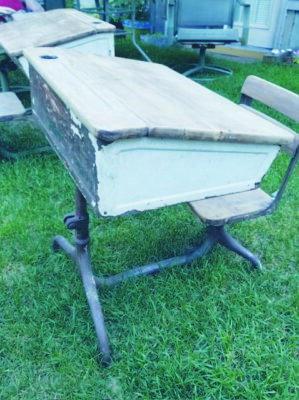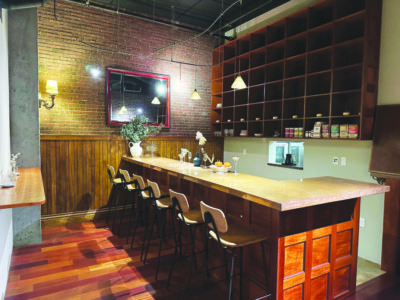Andrew Pinard discusses the future of Hatbox Theatre
The transformation of Steeplegate Mall in Concord into a mixed-use development necessitates the relocation of several tenants, one of which is the Hatbox Theatre. Founded in 2016 by Andrew Pinard, Hatbox Theatre has been an active entity in the local arts community. The absence of a long-term lease now leads to the theater’s imminent closure, disrupting a season that was set to include 15 diverse productions. Pinard talked about the impact of this development on the theater, its future plans and the broader implications for the arts community in Concord. See hatboxnh.com for updates.
What exactly transpired with the closure of Hatbox Theatre?
The closure was abrupt. We knew there was a possibility of this happening when the previous owners evicted almost everyone without long-term leases nearly two years ago, but the actual timing was unexpected. The city has been pushing to get rid of the mall and replace it with housing, and they finally found a developer who bought the mall. This new developer plans to demolish the buildings and construct 625 market-rate apartments, along with a Costco and Whole Foods. Communication with the new owners was scarce, and we struggled to get information. We were assured at one point that we would have until May or June of 2024, but suddenly, in November, just before Thanksgiving, we were informed that we had to be out by the end of January. It was quite a shock.
What has been the community’s response?
There’s a lot of people who are very sad and very disappointed that we might close permanently if we can’t find another space to work in. Our audiences and the artists who have performed here are really supportive and enthusiastic about us finding a new space, and we’re grateful for them. I’ve had recommendations from dozens of people suggesting various spaces. The community’s reaction shows their deep investment in Hatbox and their concern for the future of local arts in our area. Unfortunately I haven’t been too optimistic about the elected, civic and business leaders in Concord. They acknowledge our work but haven’t fought very hard to keep us in the community. They never really made us feel like we were something special.
What immediate steps are you taking to manage this transition for Hatbox Theatre?
We’ve been evaluating a number of spaces for short-term and long-term use. We’re looking at Manchester, Epsom, Nashua, Bedford. We’ve looked at about 28 different locations so far and that includes both shared spaces and exclusive spaces. We’re looking at mid-March at the very earliest to launch programming in other nomadic locations. Our business model has always been that ticket sales cover the overhead of the space while allowing us to give 55 percent of the revenue to the production companies that are in the space. We are transitioning the organization to a not-for-profit to potentially expand our revenue beyond ticket sales, which could conceivably mean that we can purchase a location so that we’re not at the mercy of somebody kicking us out. That would also mean we could begin fundraising and things of that nature so that we can afford places like that.
How do you think this will affect Concord’s art scene?
It’s going to be a big loss for Concord, for the local artists and for the audience who regularly attend our shows. We’re in our ninth year now, and we’ve had over 36,000 people through our space since we opened in April 2016. We’ve hosted numerous world premieres and given a platform to local artists. Our venue was a place where smaller production companies and local artists could showcase their work. Many local artists got their start here, and without Hatbox there’s a fear that emerging talents might not find similar opportunities. The local arts scene will lose a unique venue that provided a space for experimental and avant-garde productions. Its closure could mean a more homogenized arts scene in the city. It’s not just about losing a physical space. It’s about losing a community hub for artists and audiences alike.
What are you looking for in a community to relocate to?
We want a community that really either wants us or needs us and really deeply wants to be involved. Ideally we’d find a community that has a space like a mill building or a fire station that they’re looking to repurpose to reinvest in their community. And we’re looking for a community that will support the community that has supported us.




















